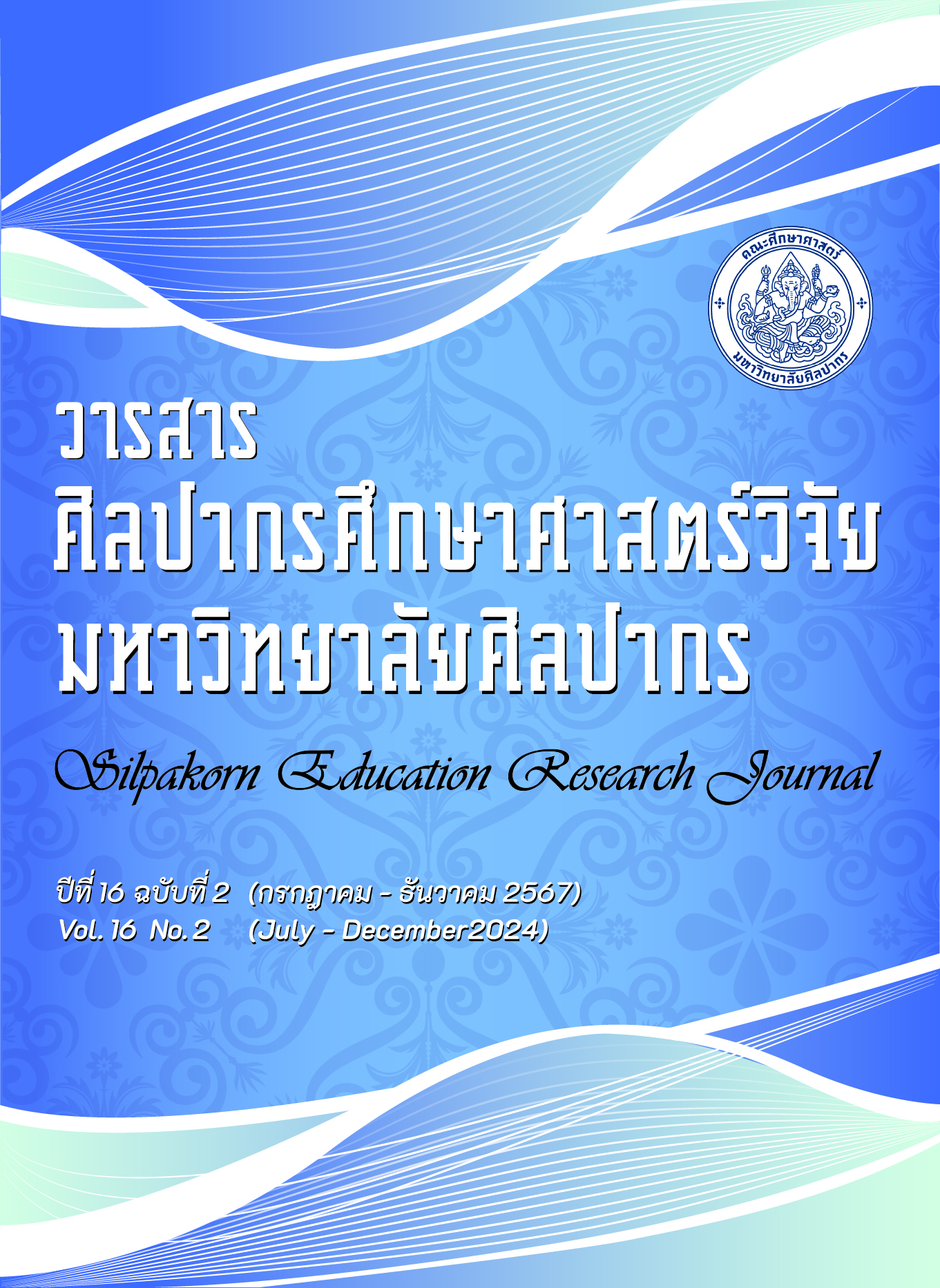การพัฒนาสื่อการสอนวิทยาศาสตร์บูรณาการกับศิลปวัฒนธรรมและภูมิปัญญาท้องถิ่น โดยนักศึกษาครูวิทยาศาสตร์ : กรณีศึกษาจากแหล่งการเรียนรู้ประวัติศาสตร์เมืองละโว้
คำสำคัญ:
สื่อการสอนวิทยาศาสตร์, วิทยาศาสตร์บูรณาการ, ศิลปวัฒนธรรมและภูมิปัญญาท้องถิ่นบทคัดย่อ
การวิจัยนี้มีวัตถุประสงค์เพื่อ 1) ศึกษาแนวทางการพัฒนาสื่อการสอนวิทยาศาสตร์บูรณาการกับศิลปวัฒนธรรมและภูมิปัญญาท้องถิ่น 2) ศึกษาความรู้ ทักษะ และเจตคติของนักศึกษาในการพัฒนาสื่อการสอนวิทยาศาสตร์ที่บูรณาการกับศิลปวัฒนธรรมและภูมิปัญญาท้องถิ่น กลุ่มที่ศึกษา คือนักศึกษาครูสาขาวิชาวิทยาศาสตร์ทั่วไป ชั้นปีที่ 2 จำนวน 38 คน ซึ่งลงทะเบียนเรียนในรายวิชาวิทยาศาสตร์บูรณาการ 1 ภายหลังจากการเรียนในห้องเรียน นักศึกษาได้เข้าร่วมกิจกรรมกาออกแบบและจัดทำสื่อการสอนวิทยาศาสตร์ที่บูรณาการกับศิลปวัฒนธรรมและภูมิปัญญาท้องถิ่นจากแหล่งเรียนรู้ทางประวัติศาสตร์เมืองละโว้ ผลการวิจัย พบว่า 1) แนวทางในการพัฒนาให้นักศึกษาสามารถสร้างสื่อการสอนวิทยาศาสตร์ที่บูรณาการกับศิลปวัฒนธรรมและภูมิปัญญาท้องถิ่นได้อย่างมีประสิทธิภาพนั้น ประกอบด้วยหลายวิธีการ ได้แก่ การให้นักศึกษาได้เรียนรู้แนวคิดทางวิทยาศาสตร์ผ่านการลงมือปฏิบัติ การวิเคราะห์แนวคิดวิทยาศาสตร์ที่อยู่เบื้องหลังศิลปวัฒนธรรมและความรู้ในท้องถิ่นการออกแบบกิจกรรมการเรียนรู้ร่วมกับการการใช้เทคโนโลยีสารสนเทศ การออกแบบสื่อการสอนเชิงบูรณาการร่วมกับกำหนดแนวทางการสอน และการให้นักศึกษาได้ศึกษาจากแหล่งเรียนรู้ทางประวัติศาสตร์ 2) นักศึกษามีความรู้ ทักษะ และเจตคติต่อการพัฒนาสื่อการสอนวิทยาศาสตร์ที่บูรณาการกับศิลปวัฒนธรรมและภูมิปัญญาท้องถิ่น มากที่สุดทุกประเด็น โดยประเด็นที่ได้รับคะแนนสูงสุด 3 อันดับแรก ได้แก่ ความพึงพอใจและความภาคภูมิใจในการทำกิจกรรมสร้างสื่อการสอน, ความพร้อมในการนำความรู้ด้านวิทยาศาสตร์ ศิลปวัฒนธรรมและภูมิปัญญาท้องถิ่นไปใช้ในชั้นเรียนจริง และการเห็นคุณค่าของศิลปวัฒนธรรมและภูมิปัญญาท้องถิ่น
เอกสารอ้างอิง
Aikenhead, G. S. (2006). Science Education for Everyday Life: Evidence-Based Practice. Teachers College Press.
Amalia, S., and Wuryandani, W. (2020). Socio-Cultural Based Learning Module for Critical Thinking Ability in Elementary School: Systematic Search. Acta Educationis Generalis, 10(2), 180- 187.
Barnhardt, R., and Oscar Kawagley, A. (2005). Indigenous Knowledge Systems and Alaska Native Ways of Knowing. Anthropology and Education Quarterly, 36(1), 8-23.
Chatmaneerungcharoen, S. (2016). Science Teachers' Pedagogical Content Knowledge and Technology Integration for Community-Based Learning Management in Local Contexts and the Philosophy of Sufficiency Economy. Journal of Academic Affairs of Phuket Rajabhat University, 12(2), 107-139. (in Thai)
Chou, C. P., Roberts, A., and Ching, G. S. (2012). A Study on The International Students’ Perception and Norms in Taiwan. International Journal of Research Studies in Education, 1(2), 71-84.
Dei, G. J. S. (2000). Rethinking the Role of Indigenous Knowledges in the Academy. International Journal of Inclusive Education, 4(2), 111-132.
Gay, G., and Howard, T. C. (2000). Multicultural Teacher Education for the 21st Century. The Teacher Educator, 36(1), 1-16.
Glasson, S. S., Chambers, M. G., Van Den Berg, W. B., and Little, C. B. (2010). The OARSI Histopathology Initiative–Recommendations for Histological Assessments of Osteoarthritis in the Mouse. Osteoarthritis and cartilage, 18, 17-23.
Hua, Z., Wenjun, Z., and Pinar, W. (2014). The Hangzhou Model of Internationalization. EuroJCS, 1(1), 15-21.
Kharintha, P., and Sapphasuk, W. (2023). The Development of Learning Activities Based on Community-Based Learning with Critical Pedagogy to Promote Global Citizenship for Grade 9 Students. Silpakorn Educational Research Journal, 15(2), 177-193. (in Thai)
Lopez, A. E. (2011). Culturally Relevant Pedagogy and Critical Literacy in Diverse English Classrooms: A Case Study of a Secondary English Teacher's Activism and Agency. English Teaching: Practice and Critique, 10(4), 75-93.
Moll, L. C., Amanti, C., Neff, D., and Gonzalez, N. (1992). Funds of Knowledge for Teaching: Using a Qualitative Approach to Connect Homes and Classrooms. Theory into Practice, (31), 132-141.
Office of the Education Council Secretariat. (2017). National Education Plan B.E. 2560-2579 . Bangkok: Ministry of Education. (in Thai)
Oungsangkune, D. (2021). The Development of Multimedia Based on the Concepts of Science, Technology, Society and Environment with Integrating Local Curriculum on the Title “Na Klua Samutsakhon,” to Encourage Analytical Thinking and Scientific Attitude Abilities of the Students in Primary 5. Journal of Teacher Professional Development, 2(3), 15-26. (in Thai)
Promsuk, T., and Tunyaboontrakun, P. (2023). Development of Art Activities Based on Constructionism Through Multimedia Learning to Enhance Soft Skills for 21st Century Students). Silpakorn Educational Research Journal, 15(1), 246-264. (in Thai)
Snively, G., and Corsiglia, J. (2001). Discovering Indigenous Science: Implications for Science Education. Science Education, 85(1), 6-34.
United Nations Educational, Scientific and Cultural Organization (2017). Local Knowledge, Global Goals: The Role of Indigenous Knowledge in the UN 2030 Agenda. Paris: UNESCO.





